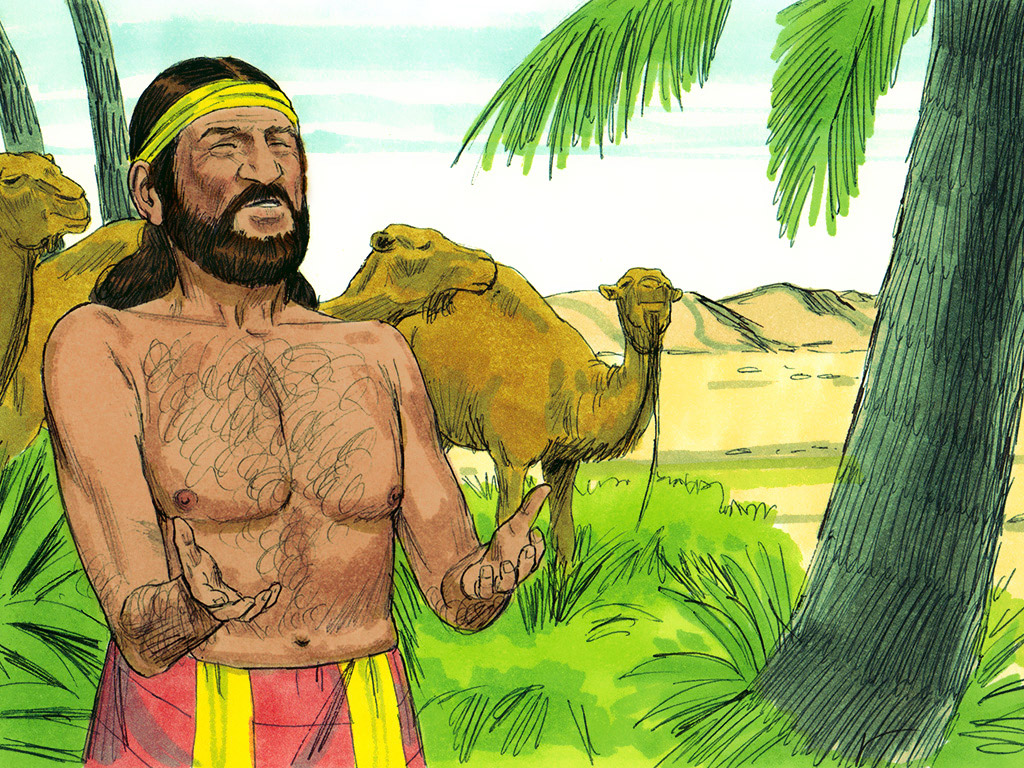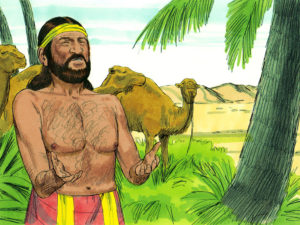 We begin this week’s parsha review with special mazel tov wishes to our long time -decades mamish- and dear friends Beverly & Leon Mehl upon the very elegant wedding last night of their son Stephan to Chaviva Pincus. Mazel tov to both extended families and may Stephan and Chaviva enjoy each other and many years of blissful marriage.
We begin this week’s parsha review with special mazel tov wishes to our long time -decades mamish- and dear friends Beverly & Leon Mehl upon the very elegant wedding last night of their son Stephan to Chaviva Pincus. Mazel tov to both extended families and may Stephan and Chaviva enjoy each other and many years of blissful marriage.
Raboyseyee and Ladies:
The Great Mitzvah Grab
Shoin this past shabbis a non-observant Yid currently married to a Hindu shiksa but planning on a divorce and remarriage one day to a nice Jewish girl asked the Oisvorfer azoy: who was the first ever Jewish person? Was it Noah? Was it Abraham? Nu, those are taka excellent kashas (questions), and we shall briefly explore them below in this, our 7th -OMG- review of this most amazing parsha. Thousands of years later, Parshas Chaya Soro still brings thousands of men together over in Chevroin where they share a room, floor space, bathrooms, showers, a mattress, and who knows what else, as they daven, dance and dine while remembering our Matriarch Soro.
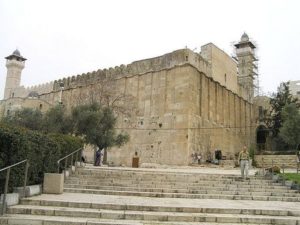 Was Noiach the first Jew? Not! He was mamish a goy but one the RBSO liked. He had charm, personality and was seemingly a good and righteous man. As a reward, the RBSO saved him and his family, along with his pets and animals, enough of them to populate the first ever zoo. Later on, He gave Noiach’s children, also non-Jews, what we all refer to as the seven Noahide Laws. Even in contemporary times, there is a rather large group of people out of Wylie, Texas who call themselves the B’nai Noiach, all non-Jews who follow these laws. A close friend of the Oisvorfer has spoken before this group on several occasions. Bottom line: Noiach was not the first Jew!
Was Noiach the first Jew? Not! He was mamish a goy but one the RBSO liked. He had charm, personality and was seemingly a good and righteous man. As a reward, the RBSO saved him and his family, along with his pets and animals, enough of them to populate the first ever zoo. Later on, He gave Noiach’s children, also non-Jews, what we all refer to as the seven Noahide Laws. Even in contemporary times, there is a rather large group of people out of Wylie, Texas who call themselves the B’nai Noiach, all non-Jews who follow these laws. A close friend of the Oisvorfer has spoken before this group on several occasions. Bottom line: Noiach was not the first Jew!
Was Avrohom the first Jew? Shoin, that’s also debatable. Certainly he was the first to have been instructed to enter into a covenant with the RBSO by giving of himself, or more correctly stated, by giving of his organ, a piece of it. He was perhaps the world’s first monotheist, though that too is in dispute. He was certainly efsher the world’s first ever humanitarian and overall good guy. The RBSO chose him to be one of our forefathers. Says the heylige Toirah (Bereishis 17 : 4-5) azoy:
| 4. “As for Me, behold My covenant is with you, and you shall become the father of a multitude of nations. | דאֲנִי הִנֵּה בְרִיתִי אִתָּךְ וְהָיִיתָ לְאַב הֲמוֹן גּוֹיִם: | |
| 5. And your name shall no longer be called Abram, but your name shall be Abraham, for I have made you the father of a multitude of nations. | הוְלֹא יִקָּרֵא עוֹד אֶת שִׁמְךָ אַבְרָם וְהָיָה שִׁמְךָ אַבְרָהָם כִּי אַב הֲמוֹן גּוֹיִם נְתַתִּיךָ: |
And taka three different religions and mistama several billion people all claim him as their father. Was he the first Yid? Ver veyst? He was certainly the personification of the future Yid. Let’s ober be mindful that the ‘Ivrim’ became a nation unto God only much later at Revelation when they gathered at the foot of Mt Sinai.
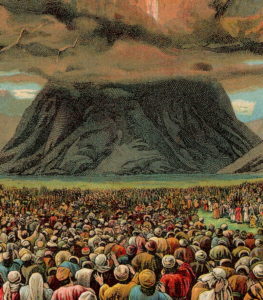 Shoin, just last week we learned that according to one opinion, Yitzchok, following his narrow escape from the Akeydo where he was set to be sacrificed on the altar, found himself over at the Yeshiva of Sheym & Eyver where he hung out for three years. Sheym was one of Noiach’s three boys and Eyver was Noaich’s great grandson. Both lived many hundreds of years. Next week we will learn that Rivka, experiencing a difficult pregnancy, found her way over to that same yeshiva seeking counsel. In a few weeks, we will learn that Yaakov, Yitzchok’s son, spent 14 years at that very academy. And as mentioned on more than one occasion, our exegetes use this maybe mythical yeshiva to fill in missing years of Toirah personalities.
Shoin, just last week we learned that according to one opinion, Yitzchok, following his narrow escape from the Akeydo where he was set to be sacrificed on the altar, found himself over at the Yeshiva of Sheym & Eyver where he hung out for three years. Sheym was one of Noiach’s three boys and Eyver was Noaich’s great grandson. Both lived many hundreds of years. Next week we will learn that Rivka, experiencing a difficult pregnancy, found her way over to that same yeshiva seeking counsel. In a few weeks, we will learn that Yaakov, Yitzchok’s son, spent 14 years at that very academy. And as mentioned on more than one occasion, our exegetes use this maybe mythical yeshiva to fill in missing years of Toirah personalities.
Back to Noaich. We all then agree that he wasn’t Jewish. And if Noiach wasn’t Jewish, and unless his children, and specifically Sheym, converted to Judaism, neither was he or they. And if he wasn’t Jewish, mistama neither was Eyver, his grandson. Yet these two goyim opened a yeshiva and punkt (specifically) their prize students included none other than two of our patriarchs, Yitzchok and Yakkov?! And our Matriarch Rivka too went there with her shaylis (queries)? Was it the first ever co-ed yeshiva? Shoin, that might help explain why Yitzchok and Yaakov, both single at the time, made their way to the yeshiva of Sheym & Eyver? What’s taka pshat here? How could Sheym own and operate a yeshiva which carried his name when he himself wasn’t Jewish? Would Yitzchok have boarded in a yeshiva whose founders and administration were all goyim? Would Yaakov have spent 14 years at a non- Jewish yeshiva? Would you? Was it an out of state college? And what the hec were they studying in this yeshiva? The heylige Toirah which was not given until close to 500 years later? Efsher the heylige Mishneh which was codified in 190CE, or the heylige Gemora codified in 580CE? Would you enroll your kinderlach in any yeshiva where the Rosh Yeshiva (Headmaster) was a goy mamish?
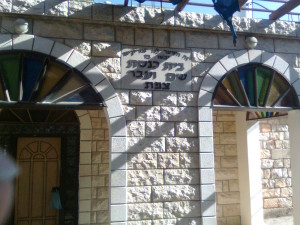 Nu, efsher we can kler that Sheym was teaching all the bochurim how to walk backwards in the event any one of them came home and found his father naked and in a drunken stupor. Why not? Is there any evidence or even discussion that Sheym, son of Noiach converted? Nu, efsher we can kler that Sheym & Eyver, in Trump style, merely licensed out their good names to others looking to run a yeshiva. Hey, it’s business. Ober, doesn’t the heylige Gemora (Sanhedrin 59a) teach us that a goy may not learn Toirah lest he be subject to the death penalty? Grada it does! Was Noiach Jewish? Not! Case closed? Maybe not. As you can imagine, this topic too is hotly debated and in the end, a few conclude that since Noiach did not worship idols, though he was zicher still a goy mamish, it was perhaps ok for him to learn the Toirah. Were they efsher studying Hammurabi’s code which, according to some, was already reduced to writing in the times of Sheym & Eyver? Or, were they studying spirituality, what they thought was the will of the RBSO, concepts which would eventually appear in the heylige Toirah? Perhaps.
Nu, efsher we can kler that Sheym was teaching all the bochurim how to walk backwards in the event any one of them came home and found his father naked and in a drunken stupor. Why not? Is there any evidence or even discussion that Sheym, son of Noiach converted? Nu, efsher we can kler that Sheym & Eyver, in Trump style, merely licensed out their good names to others looking to run a yeshiva. Hey, it’s business. Ober, doesn’t the heylige Gemora (Sanhedrin 59a) teach us that a goy may not learn Toirah lest he be subject to the death penalty? Grada it does! Was Noiach Jewish? Not! Case closed? Maybe not. As you can imagine, this topic too is hotly debated and in the end, a few conclude that since Noiach did not worship idols, though he was zicher still a goy mamish, it was perhaps ok for him to learn the Toirah. Were they efsher studying Hammurabi’s code which, according to some, was already reduced to writing in the times of Sheym & Eyver? Or, were they studying spirituality, what they thought was the will of the RBSO, concepts which would eventually appear in the heylige Toirah? Perhaps.
Finally, what has all this to do with our parsha which opens with Avrohom’s efforts to secure and purchase a suitable piece of land from the Chiti people in order to bury and mourn for his beloved but now departed eishes chayil, Soro? Nu, as mentioned, we have previously covered this parsha in depth, ober let’s begin with a shtikel review of its highlights. And while we don’t know with certainty where Yitzchok went or was following his Akeydo scare, one thing we do know: there is no mention of him being in attendance at his mother’s funeral. The heylige Toirah is silent mamish! We need to contrast this lack of information with very specific text later in the parsha which tells us that both Yitzchok and Yishmoel attended to Avrohom’s funeral arrangements. In fact, many a medrish will comment on their reunion. Much later in Bereishis (Genesis), we will read in even greater detail how Yakkov’s boys all attended his funeral. And the question is azoy: why taka is the heylige Toirah silent mamish on whether or not Yitzchok was in attendance? Did he not get word? Was he too engrossed in his studies over at the Sheym & Eyver yeshiva? Or, was he efsher still smarting from the Akeydo incident and decided to boycott? Did he think his mother was a co-conspirator?
On the other hand, who suggests he wasn’t there? And just because the heylige Toirah does not mention his presence, nor his absence, does that suggest he wasn’t there? Some will proffer and even swear that avada he was. May we assume that he wasn’t, or was, in attendance? Are we out of bounds by suggesting that he may have been absent? Ver veyst? On the other hand, which God fearing, well rounded, educated, and enlightened boy or man would choose not to attend his own mother’s funeral? Interestingly enough, there is kimat nothing written or asked by the medrish on this anomaly. On the other hand, what do we know about Rivka’s funeral? Also nothing. And Leah’s? Again, nothing. Details of Rochel’s levaya are provided; then again, her marriage was a love story.
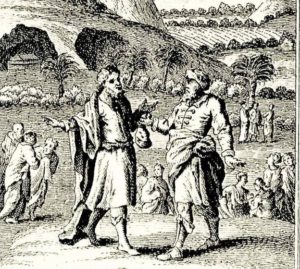 Nu, earlier we asked if Avrohom was efsher the first Yid? We don’t know, ober we can efsher bring proof that he wasn’t by the way he conducted his negotiations with Efroin, King of Chitis (Hittites). While Efroin offered to give Avrohom the Machpelo Cave and the land around it for free mamish, Avrohom insisted on paying retail; full price! Unlike the lack of detail regarding the funeral and Yitzchok’s attendance, the back and forth negotiations between Avrohom and king Ephroin are told in great detail. Every offer and counter offer is recorded in the heylige Toirah. In the end, Avrohom paid full price, efsher more, proving azoy: the school of people who claim Avrohom was not the first Yid, may have a leg, perhaps two, to stand on. Yiddin don’t pay full price when something is offered free. Real Yiddin hit the bid when they hear the word FREE! In any event, though our zeyda Avrohom did pay full price and efsher more, his purchase remains mired in controversy ad hayoim hazeh (until today). Our Arabishe cousins continue to challenge the validity of his purchase. Shoin.
Nu, earlier we asked if Avrohom was efsher the first Yid? We don’t know, ober we can efsher bring proof that he wasn’t by the way he conducted his negotiations with Efroin, King of Chitis (Hittites). While Efroin offered to give Avrohom the Machpelo Cave and the land around it for free mamish, Avrohom insisted on paying retail; full price! Unlike the lack of detail regarding the funeral and Yitzchok’s attendance, the back and forth negotiations between Avrohom and king Ephroin are told in great detail. Every offer and counter offer is recorded in the heylige Toirah. In the end, Avrohom paid full price, efsher more, proving azoy: the school of people who claim Avrohom was not the first Yid, may have a leg, perhaps two, to stand on. Yiddin don’t pay full price when something is offered free. Real Yiddin hit the bid when they hear the word FREE! In any event, though our zeyda Avrohom did pay full price and efsher more, his purchase remains mired in controversy ad hayoim hazeh (until today). Our Arabishe cousins continue to challenge the validity of his purchase. Shoin.
Nu, following the passing of Soro, Avrohom, recalling the RBSO’s promise to make him unto a great nation and his people many, decides that in order for the promise to be effectuated, he needs Yitzchok, nebech still single and just about 40 years of age, to get married and have offspring. What next? He hires the first ever shadchan (matchmaker) -let’s recall that the RBSO Himself matched up Odom and Chava- and the next 67 pisukim of the parsha are dedicated to the entire shidduch process, culminating with Yitzchok getting to know, if you chap, and only later falling in love with his new bride Rivka who was all of three years old at the time, according to some. Not bad for a forty year old. In our times, he would have zicher have been arrested and locked up for 20 years.
Let’s review a few key pisukim before we ask a mamish mind-boggling question.
| 2. And Abraham said to his servant, the elder of his house, who ruled over all that was his, “Please place your hand under my thigh. | בוַיֹּאמֶר אַבְרָהָם אֶל עַבְדּוֹ זְקַן בֵּיתוֹ הַמּשֵׁל בְּכָל אֲשֶׁר לוֹ שִׂים נָא יָדְךָ תַּחַת יְרֵכִי: | |
| 3 And I will adjure you by the Lord, the God of the heaven and the God of the earth, that you will not take a wife for my son from the daughters of the Canaanites, in whose midst I dwell. | גוְאַשְׁבִּיעֲךָ בַּיהֹוָה אֱלֹהֵי הַשָּׁמַיִם וֵאלֹהֵי הָאָרֶץ אֲשֶׁר לֹא תִקַּח אִשָּׁה לִבְנִי מִבְּנוֹת הַכְּנַעֲנִי אֲשֶׁר אָנֹכִי יוֹשֵׁב בְּקִרְבּוֹ: | |
| 4 But you shall go to my land and to my birthplace, and you shall take a wife for my son, for Isaac.” | דכִּי אֶל אַרְצִי וְאֶל מוֹלַדְתִּי תֵּלֵךְ וְלָקַחְתָּ אִשָּׁה לִבְנִי לְיִצְחָק: |
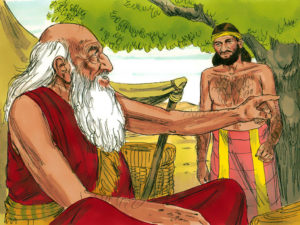 And how do you like that? Avrohom empowers his trusted servant of many years, Eliezer, to travel out of town and find a suitable wife for his holy son Yitzchok. Avrohom instructs Eliezer not to bring back any girl of K’nanee descent. Instead he wants him to travel back to the city of his birth (Ur Kasdim) where he is to look for a suitable mate. And not fully trusting Eliezer, Avrohom will make him swear that he will follow orders. Let’s read that posik again. Said Avrohom what? He asked Eliezer to place his hand where and hold what? Is this the heylige Toirah we are reading? Is this the efsher the mikoir (source) for rebbes taking liberties with their talmidim (students)? Were your son to come home and tell you that his rebbe asked him to swear and then made him place his hands under his ‘yerech’ -seemingly a euphemism for the penis- as part of the swearing ceremony, would you not have a few choice words and more to say to the rebbe and the principal? Grada a scenario just like this played out over many years over in Brooklyn; sadly it took over 35 years for the matter to be resolved. Shoin, Rashi will get to the bottom of these words and tell us azoy: Avrohom asked Eliezer to place his hands on Avrohom’s mila (penis) and then swear -while holding it- that he will follow Avrohom’s orders. Now hold on: we have a few questions. Admittedly we have asked and answered a few of these questions in the past, and you can find them by clicking onto archives at www.oisvorfer.com, ober, we are back this year with a few we never touched upon.
And how do you like that? Avrohom empowers his trusted servant of many years, Eliezer, to travel out of town and find a suitable wife for his holy son Yitzchok. Avrohom instructs Eliezer not to bring back any girl of K’nanee descent. Instead he wants him to travel back to the city of his birth (Ur Kasdim) where he is to look for a suitable mate. And not fully trusting Eliezer, Avrohom will make him swear that he will follow orders. Let’s read that posik again. Said Avrohom what? He asked Eliezer to place his hand where and hold what? Is this the heylige Toirah we are reading? Is this the efsher the mikoir (source) for rebbes taking liberties with their talmidim (students)? Were your son to come home and tell you that his rebbe asked him to swear and then made him place his hands under his ‘yerech’ -seemingly a euphemism for the penis- as part of the swearing ceremony, would you not have a few choice words and more to say to the rebbe and the principal? Grada a scenario just like this played out over many years over in Brooklyn; sadly it took over 35 years for the matter to be resolved. Shoin, Rashi will get to the bottom of these words and tell us azoy: Avrohom asked Eliezer to place his hands on Avrohom’s mila (penis) and then swear -while holding it- that he will follow Avrohom’s orders. Now hold on: we have a few questions. Admittedly we have asked and answered a few of these questions in the past, and you can find them by clicking onto archives at www.oisvorfer.com, ober, we are back this year with a few we never touched upon.
 Rashi quoting the medrish will tell us that as part of the swearing ceremony, or perhaps to validate it, Eliezer needed to grab onto an item of mitzvah, or as Rashi refers to it, a ‘cheyfetz-shel-mitzvah’ (an item of mitzvah). Lets learn that Rashi innaveynig (let’s read what he says): “Since one who makes an oath must hold in his hand an object of mitzvah -more succinctly- an item with which a mitzvah is performed- such as a Torah scroll, or Tifilin, and the mitzvah of circumcision was the first mitzvah he was commanded.” Now hold on: let’s get our arms around this unusual shtikel Rashi. Rashi says what? That every time a person swears, he needs to hold in his hand an item of mitzvah, an item through which a mitzvah is performed? Exactly! And it so happens that the only mitzvah commanded of Avrohom (at this point in time) was that of circumcision. Shoin. Eliezer was asked to swear and swear he did by chapping Avrohom’s member. Now it’s taka emes that the first and only mitzvah revealed and commanded of Avrohom was for him to undergo circumcision. We also recall that Avrohom either performed or arranged circumcisions for all males in his household and that would include Eliezer. Ober what has that to do with Eliezer who was doing the swearing? And the sheylo is this: If Eliezer was asked to swear, why was he instructed to grab hold of Avrohom’s mila (penis) when efsher and more logically, he should have grabbed his own? Does this make any sense? Why on earth would the person doing the swearing need to chap the mila of the person asking him to swear? Would it not have been way more logical and certainly more bakovidick -pun intended- for Eliezer to chap his own member and then swear? And isn’t that what most men did and do ad hayoim hazeh?
Rashi quoting the medrish will tell us that as part of the swearing ceremony, or perhaps to validate it, Eliezer needed to grab onto an item of mitzvah, or as Rashi refers to it, a ‘cheyfetz-shel-mitzvah’ (an item of mitzvah). Lets learn that Rashi innaveynig (let’s read what he says): “Since one who makes an oath must hold in his hand an object of mitzvah -more succinctly- an item with which a mitzvah is performed- such as a Torah scroll, or Tifilin, and the mitzvah of circumcision was the first mitzvah he was commanded.” Now hold on: let’s get our arms around this unusual shtikel Rashi. Rashi says what? That every time a person swears, he needs to hold in his hand an item of mitzvah, an item through which a mitzvah is performed? Exactly! And it so happens that the only mitzvah commanded of Avrohom (at this point in time) was that of circumcision. Shoin. Eliezer was asked to swear and swear he did by chapping Avrohom’s member. Now it’s taka emes that the first and only mitzvah revealed and commanded of Avrohom was for him to undergo circumcision. We also recall that Avrohom either performed or arranged circumcisions for all males in his household and that would include Eliezer. Ober what has that to do with Eliezer who was doing the swearing? And the sheylo is this: If Eliezer was asked to swear, why was he instructed to grab hold of Avrohom’s mila (penis) when efsher and more logically, he should have grabbed his own? Does this make any sense? Why on earth would the person doing the swearing need to chap the mila of the person asking him to swear? Would it not have been way more logical and certainly more bakovidick -pun intended- for Eliezer to chap his own member and then swear? And isn’t that what most men did and do ad hayoim hazeh?
And the next kasha is azoy: many a medrish will tell us that Avrohom observed the entire Toirah kula, all 613 commandments. Ober, again we ask how was that shayich (possible) if all agree that the heylige Toirah was first given at Revelation in the year 2448? As an aside, other medroshim will proffer that Avrohom wasn’t alone. Yitzchok, Yaakov, Noiach and even Odom were Toirah observant; they kept it all. How? Ver veyst? Even Noiach? Nu of course! And how do we know? Nu, avada we recall that the RBSO instructed him to bring seven (pairs, each with a mate) of each kosher animal and but two of each non-kosher animal into the Teyvo (Ark). Ober nowhere will we find text giving Noiach a lesson in kosher? How did he in fact know which animals were kosher and which were not? How? He observed the heylige Toirah, that’s how. Though the laws of kosher were revealed only in sefer Vayikro (Leviticus) over one thousand years later, Noiach was seemingly already versed in kosher. Shoin, proof positive. And if Noiach observed, is it hard for us to imagine that Avrohom observed as well? You just need to employ your healthy imaginations. Many of you taka have vilde (wild) imaginations, and have no problem conjuring up images, mostly not so kosher, if you chap. Why not instead imagine that it’s at least possible that our Ovois (forefathers) did in fact observe a yet non-existent Toirah?
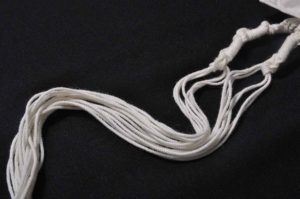 And if that’s emes, and Avrohom too was observant, and why shouldn’t he have been, mistama he also had access to a siddur, a Toirah, or at least a Chumish, and also wore his Tzitzis daily. In fact, he should have had a collection of mitzvis to grab onto just in case an oath needed to be taken. And if that’s emes, we ask again, why Avrohom asked Eliezer to grab his bris mila (organ) while swearing to uphold his mission? Why didn’t he simply have him swear by holding any of the above listed items, all objects of mitzvah?
And if that’s emes, and Avrohom too was observant, and why shouldn’t he have been, mistama he also had access to a siddur, a Toirah, or at least a Chumish, and also wore his Tzitzis daily. In fact, he should have had a collection of mitzvis to grab onto just in case an oath needed to be taken. And if that’s emes, we ask again, why Avrohom asked Eliezer to grab his bris mila (organ) while swearing to uphold his mission? Why didn’t he simply have him swear by holding any of the above listed items, all objects of mitzvah?
Ober raboyseyee, we need to chap that according to the medrish, Avrohom taka did keep and observe the entire heylige Toirah though it was zicher not given and certainly commanded. He was a voluntary observer. Mistama he conjured up kosher images of what the RBSO wanted of him; he was a spiritual observer. He chapped! Therefore, in reality, he did not yet have physical possession of either a Toirah, Tifilin, Tzitzis or anything else. What he did have possession of was his bris mila; it was always with him, if you chap. As to why he asked Eliezer to chap his, instead of Eliezer chapping his own (as would seem more logical), shoin, the Oisvorfer is not the first to ask this question, ober he might be the first with a new twist on what went on down below. Says Reb Eliezer Ashkenazi, azoy: Avrohom was taka only commanded on circumcision and this first mitzvah was very dear to him. He performed it with great sacrifice and mistama lots of pain. Let’s recall that he was 99 years of age, efsher acted as his own Moiel (foreskin remover), and mistama did not have very sophisticated cutting instruments. And how does that answer the question? It doesn’t. Ober says Reb Ashkenazi that since Avrohom performed this mitzvah on himself before circumcising his entire household, including Eliezer, he asked Eliezer to grab hold of his, instead of his own. Good answer? Not really?
 Says the Oisvorfer azoy: men, in the general course of their daily lives, regularly chap their own milas. It’s a ritual that has been ongoing for generations; many. Let’s recall that Odom did not have relations with Chava (following the death of Kayin) for 130 years. Mistama he was swearing regularly, if you chap. In any event, swearing by chapping onto himself may not have been as memorable to Eliezer; it was a myseh b’col yoim (regular occurrence), and had he chapped his own while swearing, it’s gantz shayich (entirely possible) that he may have forgotten his mission. Just another day at work. Ober, let’s get real: everyone remembers chapping someone else’s mila, especially if coerced, or, say-it’s-not-so please, forced, if you chap. Grada in modern times, with the introduction of cell phones, followed by the Blackberry -may it rest in peace- and a shtikel later, with I phones and other smart devices, men have cut down dramatically; they need a free hand, sometimes both. The bottom line: chapping the mila and swearing were definitely connected back in Toirah times. Veyter. Moreover, holding onto Avrohom’s mila while swearing seemingly ensured that Eliezer would fulfill the request of his master Avrohom and find a suitable mate for his holy son Yitzchok. And holy he taka was. He did just that.
Says the Oisvorfer azoy: men, in the general course of their daily lives, regularly chap their own milas. It’s a ritual that has been ongoing for generations; many. Let’s recall that Odom did not have relations with Chava (following the death of Kayin) for 130 years. Mistama he was swearing regularly, if you chap. In any event, swearing by chapping onto himself may not have been as memorable to Eliezer; it was a myseh b’col yoim (regular occurrence), and had he chapped his own while swearing, it’s gantz shayich (entirely possible) that he may have forgotten his mission. Just another day at work. Ober, let’s get real: everyone remembers chapping someone else’s mila, especially if coerced, or, say-it’s-not-so please, forced, if you chap. Grada in modern times, with the introduction of cell phones, followed by the Blackberry -may it rest in peace- and a shtikel later, with I phones and other smart devices, men have cut down dramatically; they need a free hand, sometimes both. The bottom line: chapping the mila and swearing were definitely connected back in Toirah times. Veyter. Moreover, holding onto Avrohom’s mila while swearing seemingly ensured that Eliezer would fulfill the request of his master Avrohom and find a suitable mate for his holy son Yitzchok. And holy he taka was. He did just that.
And what sort of a wife does a holy man need? A virgin! Let’s learn what the heylige Toirah tells us about Rivka. Says the heylige Toirah (Bereishis 24:16), azoy: “And the girl was extremely good looking, a virgin, and no man had been with her.” OMG: What wonderful credentials. Ober Rashi and the medrish seem to bothered by the words, a few of them seem superfluous. The words tell us that Rivka was a virgin and that she was with no man. Why the double language. Isn’t it elementary to kimat all that by definition a virgin has not been known to any man? Oisvorfer readers already know that when words are missing from the text, they are filled in by Rashi, the medrish and myriad others. Ober in this case, it’s farkert: too many words!
What’s pshat she was a virgin? It’s poshit; her hymen was intact. Ober is that proof positive that no man had known her? Perhaps not and therefore the heylige Toirah tells us that taka no man had known her. Says Rashi quoting the medrish (Bereishis Rabbah 60:5) azoy: “She was a virgin;” meaning that she had not engaged in anal sex. He then goes on to explain that the ‘umois ho’oilom’ (shiksas), in their efforts to market themselves as virgins, will engage in promiscuous sexual activity, ober will not allow front entry. They will patchke (play), ober will insist that their hymens remain intact. The medrish wants to assure us of Rivka’s virtues. She was a virgin front and back, if you chap. Ober, asks the heylige Oisvorfer azoy: why tell us these things? Would we, for even a moment have suspected otherwise of our future matriarch Rivka? Had Rashi and the medrish not have so colorfully clarified, and laid it all out for us in words that conjure up minuvildike images, ever have thought -even for a moment- that a holy man such as Yitzchok, would ever be introduced to, and marry a girl that had previously lain with a man? Mistama not! As to why the medrish often fills in the holes with sexually charged descriptions, ver veyst? Perhaps they were concerned that many of you would never open a sefer to learn our glorious Toirah and history. Ober they knew one thing: sex sells! Is it a wonder they are referred to as ous ‘chachomim (wise men)? Not!
A very Happy Thanksgiving to all and a gittin Shabbis
The Oisvorfer Ruv
Yitz Grossman
